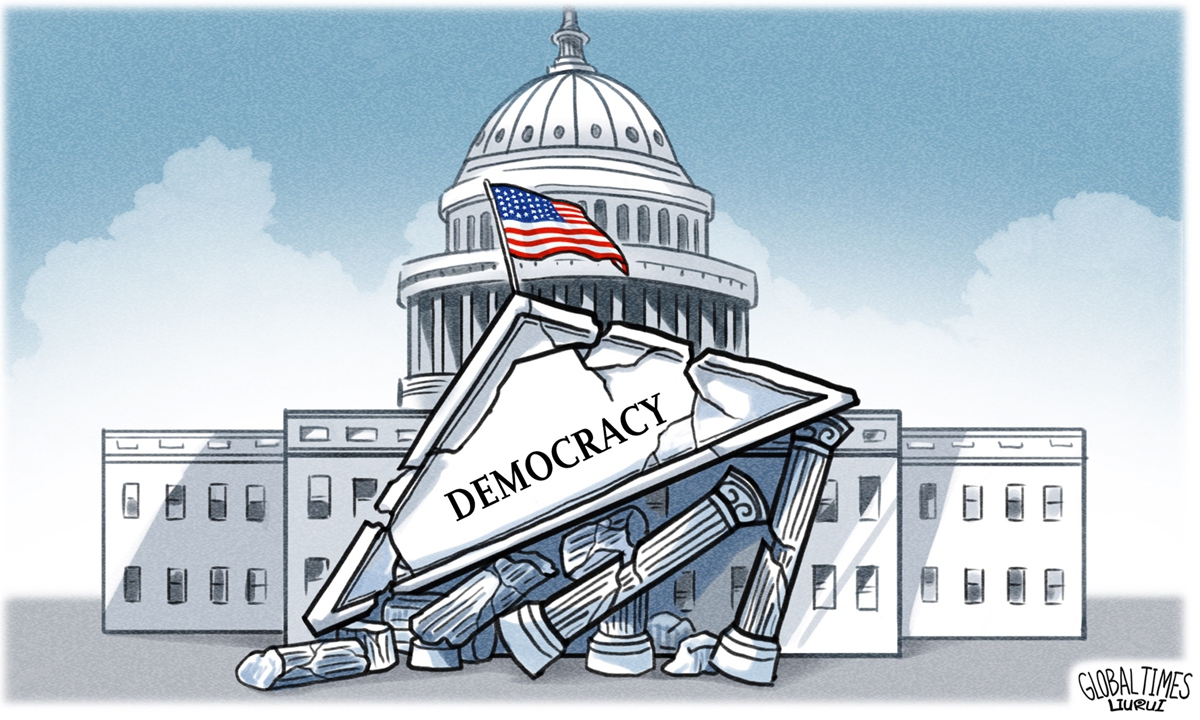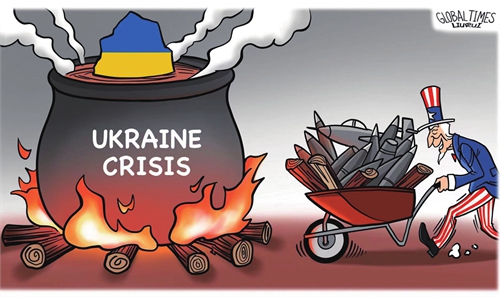
Crumbling US democracy. Illustration: Liu Rui/GT
Last Wednesday, the US Senate passed an important package of bills to provide military aid to Ukraine and Israel, which also included military aid to the island of Taiwan and a "divestment-or-ban" measure on TikTok.
During the process of passing these bills regarding geopolitical issues, it is worrisome that some US legislators have reemphasized God as a core Anglo-Saxon value, giving the bills a veneer of religious duty in order to win support.
When the Israel aid bill was being debated on the House floor, US House Speaker Mike Johnson disturbingly called for support with religious fervor, declaring, "We understand that that's our role. It's also our biblical admonition. This is something that's an article of faith for us. It also happens to be great foreign policy." He also told Newsmax last week that, "For those of us who are believers, It's a Biblical admonition to stand with Israel."
In a recent article, the New York Times said Johnson was shocked by the war stories he heard in meetings with Ukrainian President Volodymyr Zelensky and others, "all of it tugged at Mr Johnson's sense of Christian faith."
The religiosity of US politics and foreign policy is not a new issue, but at a time when the US is stepping up its forceful aid to Ukraine and Israel, and using legal programs to push China as its main rival or potential enemy, such statements fuel people's concerns about the dangers of a clash of civilizations in US global strategy.
Instead of achieving Washington's stated goal of maintaining a peaceful order, the use of religious beliefs to rally support will trigger a wider ethnic and faith-based divide, including within the US.
The framing of the Israel-Palestine conflict as a sacred mission by some US politicians has been a dangerous simplification of the Middle East issue, which is a complex mix of nationalism, territorial disputes, historical disputes and international law.
This simplification is not only intellectually lazy, irrational and short of the basic qualities required in today's world politics, but also diplomatically reckless and hegemonic. It reduces the richness and diversity of human civilization to a black-and-white narrative, which is bound to further destabilize the pluralistic international community under globalization and trigger a sharper clash of civilizations with the West.
The "clash of civilizations" theory, which gained popularity in the 1990s, suggests that the main sources of global conflict will be culture and religion. While this view is attractive because of its simplicity, it is also highly misleading. By transforming the complex, diverse structure of global society into a single, essentially antagonistic entity, it essentially calls for preparations for conflict that could ultimately make the prophecy a reality.
The push to pass the bills by emphasizing "common God" reflects a disturbing trend in American politics, that politicians lack a truly inspiring vision and have to cling to Anglo-Saxon white supremacist religious views to rally people.
This approach has also deepened the rift between groups of young Americans who are no longer as absolutely devoted to their religious beliefs as their parents were. One of the main reasons for the student demonstrations and protests that are currently taking place in the US is their opposition to the moral violations in American foreign policy.
From the demonstrations, we saw that the younger generation in the US is more inclined toward multiculturalism and supports equality and tolerance among different cultures, religions and races. This is a departure from the traditional values that place more emphasis on Western culture and Christian dominance.
This is, of course, why American politicians are raising the banner of God to gain support. They see change and realize what such change means, which makes it necessary for them to be more insistent in embedding a strong sense of civilizational superiority in national policy bills.
This trend reveals a deeper, more central and long-standing problem in US foreign policy: Washington's latent, hard-to-remove discrimination and even hatred of civilizations that are perceived as "other."
When US leaders use the flag of God to gain support for their foreign policy, they are bound to be biased, create more tension, force more countries to take sides and make it difficult for this pluralistic world to live in harmony. Politicians in Washington will eventually find that they will also lead the US into the trap of a self-fulfilling prophecy of a clash of civilizations with no end in sight.



